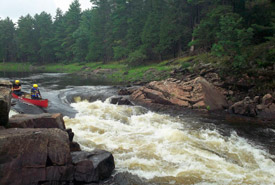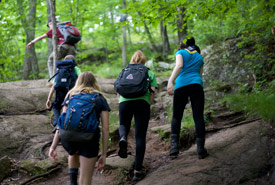Heard it from a Scout: Why nature is good for the brain

Nature can present some exciting challenges, such as canoeing through some white-water rapids! (Photo by Edward Tse)
Many of us have busy lives and hectic schedules. Whether it’s responsibilities at work, school or home, we often spend too much time indoors. Compared to lifestyles of the past, modern urban life often doesn’t provide us with the many benefits that exposure to nature can readily supply.
But spending time in the outdoors doesn't need to be complicated. It really is as easy as stepping into the wilderness!
It’s easy to underestimate the difference outdoor activities have on mental well-being. A New York Times article titled “How Walking in Nature Changes the Brain” notes that spending time in nature is shown to improve mental health and is a great stress reliever. Negative health trends, such as obesity and depression, can be mitigated over time by spending more time outside. Another more recent New York Times article titled “For Exercise, Nothing Like the Great Outdoors” explains how the enjoyment and intensity of outdoor exercise positively affects our mood, which in turn motivates us to go out and exercise again.

Hiking is a great way to explore nature and get moving! (Photo courtesy Scouts Canada)
Spending time in nature can also have positive effects on the brain by increasing happiness and creativity. A recent study in the Landscape and Urban Planning Journal assigned 60 participants to walk for 50 minutes in either a natural oak woodland setting or an urban environment around Stanford, California. The results demonstrated that those who walked in nature experienced less anxiety, more positive emotions and improved focus. The same results aren’t so easily achieved in urban environments, and it’s important that we continue to realize the potential benefits of natural landscapes.
In a related study, the same researchers wanted to understand how walking in nature impacts an individual’s focused attention on negative aspects of their lives. Participants took a 90-minute walk in either a natural or urban setting, and their brain activity was scanned before and after their walk. Those that walked in nature exhibited decreased negativity and increased brain activity in the subgenual prefrontal cortex — an area where increased activity correlates with reduced depression and anxiety.
As more health benefits resulting from exposure to green sceneries continue to be discovered, cities are integrating more plants and gardens into urban environments. In addition, city planners often include plans that ensure accessibility to natural spaces, helping to bring more people closer to the nature that surrounds us.
With all sorts of outdoor sports and activities to take part in, from a casual nature walk or canoe trip to an intense mountain climb or ski trip, there’s an activity to satisfy your outdoor cravings. So, get out there and explore! Nature awaits you, and it’s always nearby.
"Heard it from a Scout" is written by members of Scouts Canada’s Youth Spokesperson program. This post was authored by Edward Tse.


